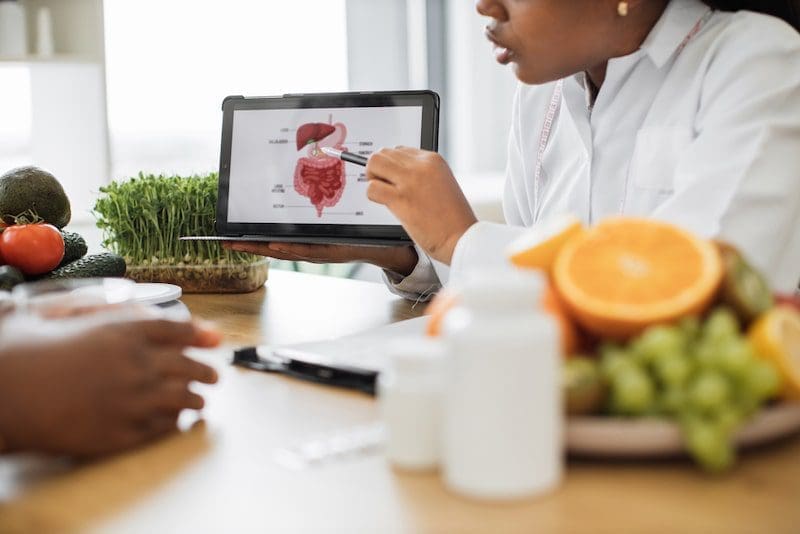Digestive health plays a vital role in our overall well-being. However, for those living with gastrointestinal disorders, daily life can be a challenge as symptoms like abdominal pain, bloating, diarrhea, and constipation become a frequent occurrence.
Luckily, there are practical strategies and lifestyle adjustments that can significantly improve your quality of life while managing a GI disorder.
Keep reading to explore eight essential tips and tricks you can incorporate into daily life to improve GI symptoms.
1) Talk to a Professional
If you think you have a GI disorder or have already been diagnosed with one, it is important to see a doctor.
A proper diagnosis is necessary to understand your condition and get the right treatment. A gastroenterologist specializes in diagnosing and treating GI disorders and can provide you with expert advice tailored to your specific needs.
2) Keep a Food Diary
Keeping a food diary detailing what you eat and when, can help you and your doctor figure out which foods trigger GI symptoms or make them worse.
In your diary, write down what you eat and its portion size in addition to the time you ate it. You will also write down how you feel after eating each snack or meal.
Over time, this information can help you and your doctor find the foods that trigger your symptoms so you can make a better eating plan.
3) Eat Appropriate Portion Sizes
Eating smaller, more frequent meals throughout the day can be easier on your digestive system and help reduce symptoms.
You can avoid overloading your digestive system by eating snacks throughout the day instead of having three large meals. Or, you can eat your breakfast, lunch, and dinner over an hour or two.
Regardless of how you choose to eat your portions throughout the day, ensure you pay attention to your nutritional needs and maintain balanced portions.
4) Modify Your Diet
Many GI disorders can be improved by changing what you eat.
Your doctor may recommend a specific diet depending on your diagnosis, such as a low-FODMAP diet for IBS or a gluten-free diet for celiac disease. The information in your food diary will also help clue you and your doctor into what changes should be made in your diet.
Following these new diet plans can greatly reduce your symptoms and improve your overall health.
5) Stay Hydrated
Staying hydrated is key to a healthy gut. Water helps make stools softer, prevents constipation, and aids digestion.
Aim to drink plenty of fluids throughout the day, but avoid carbonated beverages and caffeine, as they can worsen some GI conditions.
According to the Institute of Medicine, a healthy adult man should drink about 13 cups of water daily, and a woman should drink about 9 cups. If you struggle to get the recommended amount of water each day, consider adding hydrating fruits like watermelon and strawberries into your diet.

6) Get Physical
Exercise helps GI disorders in several ways. It stimulates digestion, reduces inflammation, improves gut health, and reduces stress.
Exercise helps to move food through the digestive system more quickly, which can help to prevent constipation and other digestive problems. Exercise can also help to reduce inflammation throughout the body, including in the gut. This can be beneficial for people with GI disorders that are characterized by inflammation, such as Crohn’s disease and ulcerative colitis.
Exercise can also help to promote the growth of beneficial bacteria in the gut microbiome, which is essential for good digestive health.
Any physical activity can be beneficial. Try walking, swimming, yoga, or biking to start.
7) Manage Your Medications
Your doctor may prescribe medications to help with your symptoms or to treat the underlying condition. It is very important to take your medications as prescribed and to tell your doctor about any side effects or concerns you have. Do not change your dosage or stop taking your medications without talking to your doctor first.
If your medications are not enough, you can also use natural herbs or foods to ease pain and alleviate symptoms.
- Artichoke reduces gas, bloating, and indigestion while improving digestive function.
- Licorice protects the stomach from acid when too much is present.
- Flaxseed is a natural laxative that provides soluble fiber.
- Cannabis aids in digestion and relieves pain ( Learn how to cook with cannabis at Veriheal.com)
- Chamomile alleviates nausea and reduces inflammation.
8) Keep Stress Under Control
The gut and the brain are closely connected, and stress can have a significant impact on the digestive system. When you are stressed, your body releases hormones such as cortisol and adrenaline. These hormones can slow down digestion, increase inflammation, and make the gut more sensitive to pain.
Additionally, GI symptoms can cause stress, which turns around and creates more GI symptoms. If your stress is not under control, you may find yourself in a painful cycle that is hard to stop.
You can limit stress in many ways. Consider lightening your workload, practicing self-care, meditating, and using aromatherapy.


